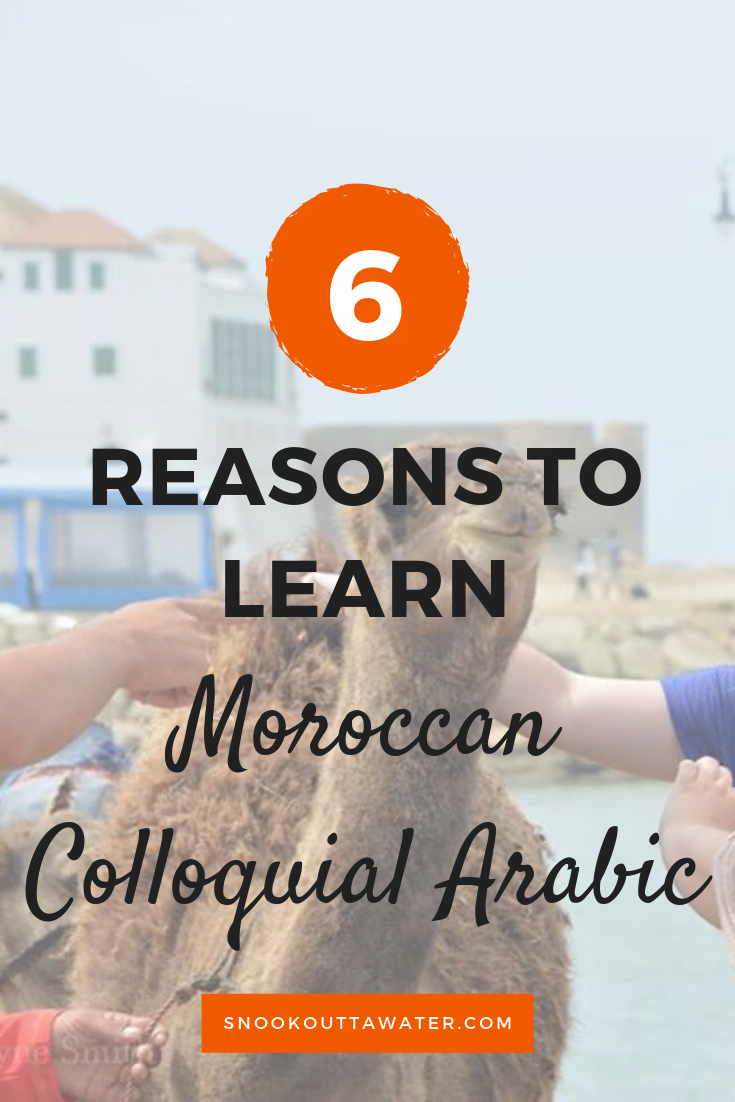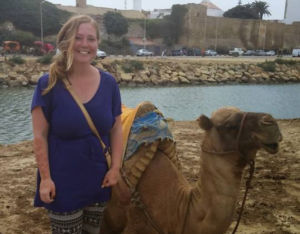6 Reasons to Learn Moroccan Colloquial Arabic
I’m the only person within my study abroad group that has come to Morocco without any background in French or Modern Standard Arabic (MSA). Therefore, my perspective is very different because I have the opportunity to learn all of the languages spoken here at the same damn time.
At first, I was intimidated. Reading a menu in French the first night in Rabat, I realized unless it was a cognate in English or Spanish, I was lost. Hearing some of the sounds of Arabic – sounds English-speakers find difficult because they aren’t within the English language – frightened me. How in the world was I supposed to communicate anything? I hadn’t even known salamu alaykum until I had arrived, fresh-faced and excited. I was assuming I’d be one of few without a background in French or Arabic – but I was unaware that I’d be the only one.
However, with this so-called hindrance, I’ve realized certain perks, the main one being that I have an incredible advantage at learning Darija, the colloquial dialect of Arabic that’s spoken here. Fellow classmates with a background in MSA find Darija frustrating and confusing—why are verb conjugations completely different? Why are there so many French words? Where the heck did shnu come from? And why is it spoken so damn fast? Is this really Arabic?
Darija is the fastest-speaking dialect within the Arab World. The percentage I’ve heard varies, but it’s about 70% Arabic; the rest is influenced by French, Spanish, and Amazigh languages (the native inhabitants of Morocco).
As a spoken language, Darija is forever evolving. Words that the youngest generation’s grandparents used are sometimes extinct. New English words have been added. The level of education one receives also impacts their Darija—many upper class Moroccans utilize way more French than lower class Moroccans. The comeback of Arabic post-independence has also, in some ways, made Darija back being closer to MSA than it previously was.

Basically, it’s fascinating. And incredible. And yet, the majority of students rarely—if ever—utilize it. My roommate and I are probably the only ones who speak Darija for the majority of our interactions with Moroccans. But, as stated, I have no other language to fall back on: my French is non-existent, and my MSA class is largely focused on writing and grammar, rather than daily interactions. I imagine if I could speak Spanish to most people, that I probably would—because it would be easier, and because I love Spanish.
Therefore, as a disclaimer, it’s easy for me to critique my classmate’s disinvestment in Darija. I have no economic investment to learn Arabic—mainly because I do not personally learn languages to advance myself economically, as I learn them to expand my ability to communicate. My major doesn’t have much to do with Arabic (although I am a political science major, I was not planning on using it within the MENA region). My reasons for being here are vastly different from the majority of my classmates.
However, it has been unsettling the amount of negative comments I have heard about Darija from fellow students. Apparently, because Darija is viewed as not as useful as MSA to their economic career choices, it’s unnecessary to learn. Sometimes, students complain if their host families speak too much Darija (like it’s their native language or something—how ridiculous!) or if people find it difficult to solely speak in MSA, a language that they learned in school and only use in more formal settings. Most students don’t care about their Darija class, and some don’t even think it should be a necessary course.
Many picked Morocco because it’s more stable and secure than other Arab-speaking countries. The location is ideal for travel, as it’s a short (and cheap) plane ride away from Europe. And, after all, we’re only here for four months—therefore, everyone needs to prioritize the language they want to focus on. However, people are missing out on not prioritizing Darija, and here’re my six reasons why:
1. Moroccans Can Understand all Other Arabic Dialects
How cool is that? Imagine if you become fluent in Darija and have some background in MSA—you could go anywhere within the Arab world and understand their dialect! Many focus on MSA because they want to be understood by as many people as possible, but to me I’d rather be able to understand everyone else. Also, why don’t more people want to pride themselves in being able to speak and understand the fastest-speaking Arabic dialect? Why isn’t this valued?
2. For the Sake of Communication
This relates to the first point. Arabic is not just Modern Standard Arabic. Foreigners receive immediate respect when they’re able to communicate in the dialect spoken—it shows investment. You’re more likely to receive deals if you’re bargaining at the Medina; you’re going to get major props at any bar or restaurant you go to; and, because people are always more comfortable speaking in their native language, they may be able to express themselves better to you. That, and even if your Darija is terrible, at the very least they’ll find it cute that you’re trying. Sometimes you can become the butt of jokes–a Moroccan friend whispered into my American friend’s ear taboun mok and told her to tell his friends that. Apparently it translates to “your mom’s vagina.” But hey, at least you can make people laugh if you try.
Moroccans go to such extremes trying to communicate with us, trying as many languages as possible—why don’t we do this as well?

Also, you’ll be able to overhear conversations (which is super important to me personally). If you constantly need someone to change the language they speak for you, than you’ll lose out on the informal conversations they have with their friends, as well as random telephone conversations that you want to eavesdrop on. Maybe I’m the only one that’s super nosey.
3. It Strengthens Your Knowledge of Arabic
My two Arabic professors do a wonderful job of showing how Darija and MSA are intertwined, as well as how they’re different. For people that like linguistics (I think I just realized here that I really enjoy it), this is invigorating. For example, my Darija professor explained that juj, which means two in Darija, stemmed from the word zawj, which means a pair (aka, two). This explains why Darija didn’t adapt the MSA word for two, which is athneen.
There are also trends that can help you understand the evolution of the language and, to a certain extent, the history of the country. When are French words integrated and why? Clothing, in particular, draws largely French influence, as well as technological items. Verbs are generally MSA verbs, yet shortened – Darija has an incredible amount of verbs that contain no vowels. “Th’s” are eliminated in order to make pronunciation easier—so, thalatha (three) becomes tlatta in Darija.
4. You Can’t Understand Nuances of a Country Without Learning the Language
The English vernacular for the youth is constantly changing as well, such as the recent phenomenon of the word twerk, or when Beyoncé coined the word bootylicious in the early 2000s. Language is never stagnant, and it’s constantly evolving and changing because of cultural adaptations. Culture cannot be separated from language, and language cannot be separated from culture. Therefore, an analysis of Moroccan culture without attempting to learn the local language just sounds ridiculous.
One of my new favorite expressions I just heard from a friend is ana hezq, which literally translates to something along the lines of ‘all I have are my farts.’ It means you’re flat broke. I’m doubtful that MSA contains such an awesome phrase that you can utilize on the street when people ask you for money. Even within English, “I’m broke” is a much more informal way to say “I don’t have any money.” Knowing informal phrases allow you to establish a more friendly relationship with others.
5. Morocco is Important for International Relations as Well
What’s up with the preoccupation of the Middle East, and not North Africa? Morocco is part of the world as well, with very interesting dynamics (including the influence of the Amazigh and African influences). Why isn’t Morocco included when people discuss their international relations major, as if the Middle East is the only part of the world worth focusing on? In fact, shouldn’t Morocco be of utmost importance, considering that it may be the most stable and secure country in the MENA region? Shouldn’t factors, such as the promotion of Sufism, be of extreme interest to those wanting to work within the Middle East?
6. It Simply Isn’t Cool to be Pretentious
How would Americans feel if young Moroccans came to America and laughed at the local vernacular and said, “I won’t speak that with you—learning that doesn’t advance my career goals!” I’d feel degraded, as if my way of speaking was not good enough or important enough for them. Imagine if you brought them to hang out with your friends and a friend said, “I ain’t going nowhere!” and they replied, “in proper English, thanks. I’m trying to get a job in foreign policy.”
In Conclusion
There you have it, six reasons why you should take the time to learn some Darija while you’re in Morocco, and especially if you’re staying for awhile. Even though you may not be able to use it outside of Morocco, that uniqueness is what makes it so fascinating!
Liked this post? Pin it!

Subscribe to receive Snook Outta Water’s monthly newsletter with exclusive updates and content.

Leave a Reply